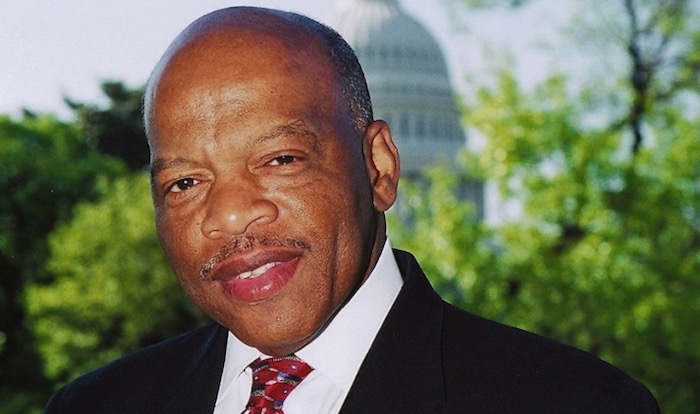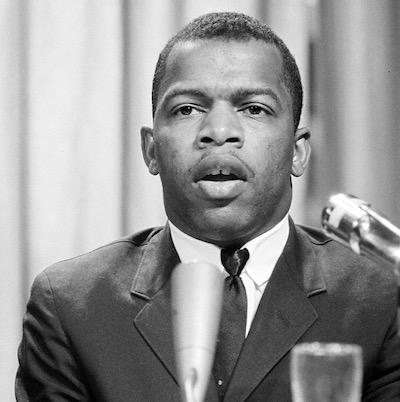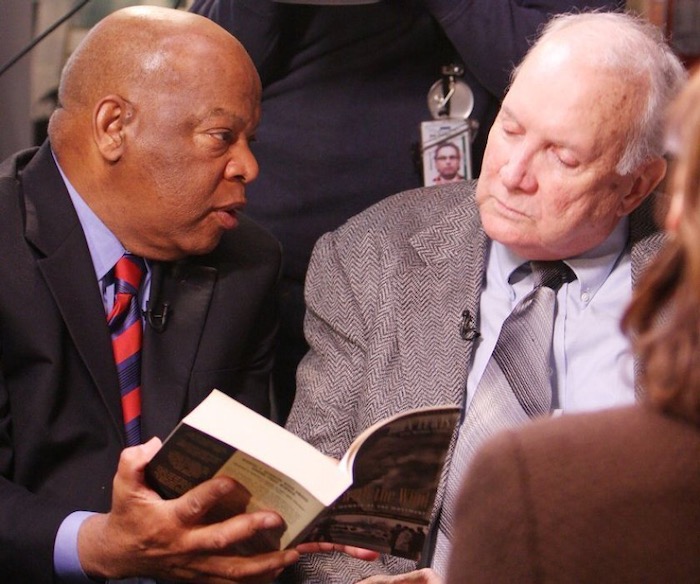
By DUNCAN NEWCOMER
Contributing Columnist
“People can change. People can change.”
These are words from John Lewis, legendary civil rights leader, speaker at the Lincoln Memorial Freedom March with Martin Luther King, Jr. and an organizer of the March 7, 1965, Selma March that changed hearts—and laws—as America took another step toward liberty and justice for all.

JOHN LEWIS AS A CIVIL RIGHTS LEADER SPEAKING TO JOURNALISTS IN 1964. In 1961, Lewis became one of the 13 original Freedom Riders. He was the first to be assaulted while in Rock Hill, South Carolina, where two white men attacked him, injuring his face and kicking him in the ribs. Three years later, Lewis took part in the March 7, 1965, Selma to Montgomery march now known as “Bloody Sunday.” When the marchers stopped to pray, police discharged tear gas and mounted troopers charged the demonstrators, beating them with night sticks. Lewis’s skull was fractured, leaving permanent scars on his head.
The skull of that Black American was fractured that day—and those scars remain. He also had been beaten earlier, in 1961, at a bus station in Rock Hill, South Carolina.
The reason Lewis was repeating the mantra of “people can change” was not just because Americans changed enough in 1965 to pass major Civil Rights legislation, including a changed President Lyndon Johnson. No, this was a personal healing he was incanting.
Half a century after his bloody baseball-bat beating in the bus station—to which he had only his non-violent response—an old man walked into Congressman Lewis’s office in Washington, D.C., with his middle-aged son and said, “Mr. Lewis, my name is Elwin Wilson. I’m one of the men who beat you in that bus station back in 1961. I want to atone for the terrible thing I did, so I’ve come to seek your forgiveness. Will you forgive me?”
Lewis did. They embraced, the son embraced, they wept, and then they talked.
People can change.
To understand the healing of America that is ahead for us all, these stories, Selma and Rock Hill, are retold by Parker Palmer in his book Healing the Heart of Democracy. This is the personal and the political healing that is possible.
Following the cataclysm of the Covid-19 virus pandemic the first place of healing is personal not political. What we can see in the heart of John Lewis and in his attacker is that cynical contempt does not have to win. Blame wins no game.
A nation of high promises, like America, is a country that will break your heart. That’s one of the central themes of our other cover story this week—about Abraham Lincoln and James Baldwin.
A broken heart must endure grief. Great grief has come to America in this pandemic. Grief follows suffering and grief can teach the spiritual purpose of suffering: to open the heart to self-sacrifice, relationship, community and to the Other.
When Elwin Wilson died in 2013, the story of his reconnection with Lewis was shared once again via The New York Times and other news media.
But the most moving words came from Lewis himself, who marked Wilson’s passing with this epilogue:
I am very sorry to learn of Elwin Wilson’s passing. It is my prayer that he will rest in peace since he made amends to many of those he had injured. He told me he wanted to be right when he met his Maker, and I believe Elwin Wilson accomplished what he set out to do.
We can all learn a valuable lesson from the life of this one man. He demonstrates to all of us that we fall down, but we can get up. We all make blunders, but we can get on the right road toward building a greater sense of community.
Elwin Wilson experienced what Martin Luther King Jr. told all of us that “hate is too heavy a burden to bear.” He demonstrated the power of love and the effectiveness of non-violent direct action not only to fix legislative injustice but to mend the wounded souls in our society, the soul of the victim as well as the perpetrator. Elwin Wilson shows us that people can change; and when they put down the mechanisms of division and separation to pick up the tools of reconciliation, they can help build a greater sense of community in our society, even between the most unlikely people. Elwin Wilson proves that we are all one people, one family, the human family—and what affects one of us affect us all.
I will never forget Elwin Wilson. I speak about our meeting often. In fact, just this morning I mentioned him to 147 students from California, New York and Ohio. And I spoke about him earlier this month on the pilgrimage to Alabama. Because this one man had the courage to seek the power of forgiveness, he stepped off the sidelines and into the pages of American history forever.

John Lewis and Elwin Wilson.
